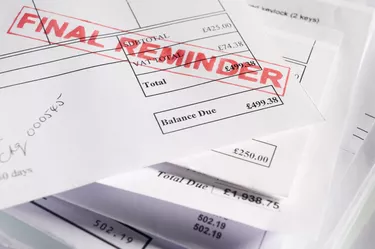
Debt collectors have an unsavory reputation, and sometimes for good reason. They've been known to stoop to extreme lows to get money out of debtors, but the fact is that most of them can't do anything unless and until they sue you in court and get a judgment first. After that, a creditor must act on its own to enforce the judgment, such as by garnishing your bank account -- the court won't take care of this on the creditor's behalf. When creditors don't know where you bank, they have a few tricks up their sleeves to find out.
They Ask You
Video of the Day
By definition, a debt collector is someone whose job it is to collect a debt you owe to a third party. It's often a lawyer or a collection company, not the party you initially contracted with. Sometimes the initial creditor hires a debt collector, but other times it sells its debts to collectors for pennies on the dollar. If the collector then manages to collect your entire debt, he keeps the balance. This gives debt collectors a lot of incentive to get your money. They'll typically begin bombarding you with phone calls and correspondence. They may ask outright for your account information and if you're rattled, you might blurt it out. If the debt collector sues you, he can serve you with interrogatories, written questions which you must answer under oath as part of the litigation. Invariably, one of those questions will be, "Where do you hold bank accounts?" If you don't answer honestly or at all, you could be held in contempt of court.
Video of the Day
They Look at Your Credit Application
In all likelihood, you completed and signed a credit application to open the account the collector is trying to get you to pay. Many credit applications ask for your bank account information. If they don't actually ask for your account number, they'll at least want to know what banking institution you do business with. If you furnish this information and if the original creditor turns the application over to the collector when selling or assigning the debt, the collector has the information.
You’ve Written Them Checks
Another dead giveaway occurs if you write a check to the debt collector. For example, you might have worked out a payment plan but then you lost your job so you were no longer able to make payments as promised. If you made even one, the collector probably has a copy of the transaction if you use a bankcard, so he has your bank name. If you wrote a check, he has your bank's routing number and your account number as well.
They Make a Lucky Guess
Debt collectors will get creative if you've given them absolutely nothing to work with. After they have a judgment against you, they can send garnishment orders to any bank they choose, hoping to get lucky. If you don't have an account there, the bank will send the garnishment order back, telling the debt collector that it's impossible to execute with that institution. If you do have an account there, the collector hits pay dirt. He'll usually start with banks that have branches close to your residence or job. If you've moved, he'll check with the post office for a forwarding address and try banks in your new area. He can check voter registration records or your state's Department of Motor Vehicles for a current address.